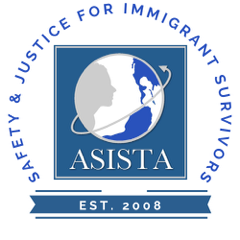Secure Communities
This library contains information about selected Immigration and Customs Enforcement (ICE) programs and how they impact survivors's safety.
Documents and Materials
ASISTA Practice Advisory: Protecting the Rights of Immigrant Survivors: Insecure Communities (Spring 2011)
This document provides a background of selected Immigration and Custom Enforcement (ICE) programs and how they impact survivors' safety. This document also provides additional considerations for working with survivors against the backdrop of these policies. Finally, the outline provides some advocacy strategies when working with systems to help ensure safety for our communities.
Copyright @2011 by ASISTA Immigration Assistance. All rights reserved. This product or any portion thereof may not be reproduced or used without express written permission from ASISTA Immigration Assistance.
ASISTA Practice Advisory in Spanish: Protección de los Derechos de los Inmigrantes Sobrevivientes de Crímenes de Violencia: Comunidades Inseguras (2011)
Este documento proporciona información sobre los programas seleccionados de Inmigración y Control de Aduanas (ICE) y cómo impactan en la seguridad de los sobrevivientes. Este documento provee también consideraciones adicionales para trabajar con sobrevivientes en el contexto de estas políticas. Finalmente brinda, en términos generales estrategias de consejería cuando se trabajar con sistemas para ayudar a garantizar la seguridad de nuestras comunidades.
Copyright @2011 by ASISTA Immigration Assistance. All rights reserved. This product or any portion thereof may not be reproduced or used without express written permission from ASISTA Immigration Assistance.
Tool Kit for Law Enforcement Use of the U Visa (Updated Nov. 2010)
Developed by Sameera Hafiz, Leslye Orloff, and Kavitha Sreeharsha of Legal Momentum, and Rodolfo Estrada of the Vera Institute of Justice (last updated November 2010)
What Can Domestic Violence and Sexual Assault Organizations Do to Help Immigrant Survivors Affected by “Secure Communities” and Related Immigration Enforcement Programs?
This project was supported by Grant No. 2011-TA-AX-K047 awarded by the Office on Violence Against Women, U.S. Department of Justice. The opinions, findings, conclusions, and recommendations expressed in this publication/program/exhibition are those of the author(s) and do not necessarily reflect the views of the Department of Justice, Office on Violence Against Women.
DHS U Visa Law Enforcement Certification Resource Guide
The Department of Homeland Security (DHS) provides this guidance to federal, state, local, tribal and territorial law enforcement officers. This public guidance primarily concerns law enforcement certifications for U nonimmigrant status, also known as U visas. This guide contains FAQs about U visas, instructions on how to fill out the form, as well as other forms of relief for victims and survivors.
The U Visa: An Affective Resource for Law Enforcement (October 2009)
Written by Stacey Ivie, M.Ed., and Natalie Nanasi, J.D.
Working with Immigrant Crime Survivors: U Findings and Purposes (October 2006)
Excerpted and adapted from the Family Violence Prevention Fund publication, collaboration to Help Trafficking Survivors: Emerging Issues and Practice Pointers, 2006 by Gail Pendleton.
Training Materials
Insecure Communities: Strategies on How to Advocate for Immigrant Survivors at Risk Under ICE Enforcement Programs (2011)
This project was supported by Grant No. 2009-TA-AX-K009 awarded by the Office on Violence Against Women, U.S. Department of Justice. The opinions, findings, conclusions, and recommendations expressed in this publication/program/exhibition are those of the author(s) and do not necessarily reflect the views of the Department of Justice, Office on Violence Against Women.
Comunidades Inseguras: Estrategias para Responder a las Necesidades de Inmigrantes Sobrevivientes de Crimenes de Violencia a Riesgo de Deportación en Base a los Programas de ICE (2011)
This project was supported by Grant No. 2009-TA-AX-K009 awarded by the Office on Violence Against Women, U.S. Department of Justice. The opinions, findings, conclusions, and recommendations expressed in this publication/program/exhibition are those of the author(s) and do not necessarily reflect the views of the Department of Justice, Office on Violence Against Women.
